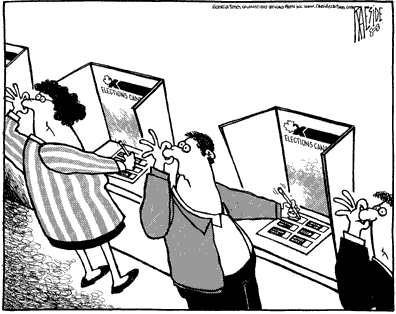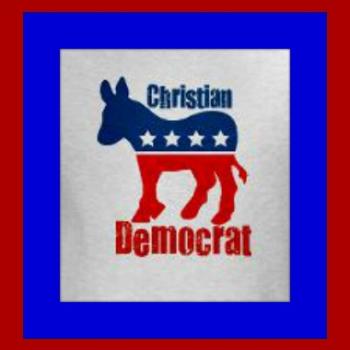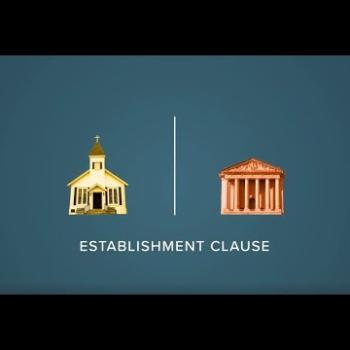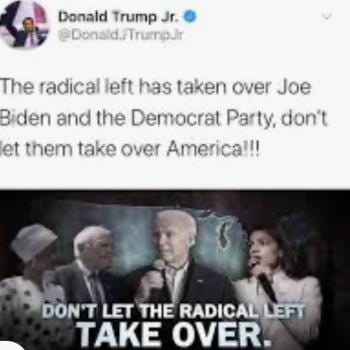
I am not a very political person. I suppose, as a history teacher, I should keep closer tabs on the wheelings and dealings of Washington D.C. Yet, I just don’t care to go very deep into that cesspool. It isn’t that I am uninterested in politics. I find the subject very fascinating and stimulating. In fact, I find politics too stimulating. Sometimes, politics can be so stimulating that it can become hazardous to one’s blood pressure readings. For that reason, I prefer to focus on other things and keep my mind out of that mess, as much as possible.
I often joke that, as a history teacher, I live most of my life in the 18th and 19th centuries. When it comes to how I approach politics, I find that to be especially true. I love studying politics of the first half of our country’s history. When we study the political history of our country, it doesn’t take a rocket scientist to notice that we haven’t really learned much about ourselves in these nearly 240 years. Before we go much farther here, let’s look back at the very beginning of our nation as a political theater.
The fact is, many of our founding fathers did not want political parties to emerge in America. They were very leery and mistrustful of the concept of parties as they had seen how divisive they could be in other nations, such as England. In fact, President Washington, in his famous Farewell Address, warned the nation against the formation of political parties. Yet, the first parties were already beginning to incubate, right under his nose, even as he was delivering that speech. Within Washington’s own cabinet of advisors were two men, so diametrically opposed across board on important issues, that an inevitable rift began to form. Secretary of State, Thomas Jefferson and Secretary of the Treasury, Alexander Hamilton were the sort of men who could not agree with each other over what color the sky was, let alone issues pertaining to how the government should be run. These two men, both of giant intellect, became the fathers of the political party system that has become the source of barroom brawls, family splits, and even untold numbers of murders (see how Hamilton died here) over the two and a half centuries since. Although the parties that formed around Hamilton’s big central government Federalist platform and Jefferson’s pro states’ rights, laissez-fair, Democratic-Republican platform are not directly applicable to today’s Republican and Democrat parties, the root arguments at the core of their debates have never gone away. In fact, nearly every huge problem that has ever bubbled to the surface on our nation’s historic timeline has one of these key, big-picture causes at it’s root. Suffice to say that, despite George Washington’s wishes that political parties not form here, that cat was well out of the bag before the words ever escaped his false-toothed pie hole. That cat has been making quite a litter box of the political landscape for a very long time now.
Here is the frustrating thing for me and I suspect a good many others (perhaps a majority?) like me. I feel held hostage by our two party system. It is a helpless and frustrating feeling that usually causes me to disconnect from it in order to go about enjoying my life. You see, I am a political agnostic…I don’t know which party I should believe in. Call me wishy-washy, cowardly, spineless, whatever you will, but that is where I stand…pretty much in the middle. I truly believe that the majority of Americans feel like I do. Most of us are closer to the middle of the political spectrum than to the extreme right or left. Yet, who do we see on tv all the time? We see people screaming at each other from the far right or the far left. The media loves the folks screaming near the fringe. The people out there on the edges make the most interesting new stories. Even though they may be pretty far removed from the political beliefs of the majority of Americans, the messages streaming from the loud mouths out closer to the extreme ends of the political spectrum become, by default, at least part of the perceived platform of their perspective party…the two horses to which we are consequently forced to hitch our wagon. To some degree, today’s 24-hour a day media mega-machine has helped to exacerbate the problem.
I have been blessed with some very thoughtful and intelligent friends, who are pretty far left and some very thoughtful and intelligent friends that are pretty far right. The thing about being way out on one end of the political spectrum is, you are too far away to even see or hear what the other end is saying. It is us poor souls near the middle that have to hear it all in stereo coming from both directions. Being near the middle, I can see some validity in some of the opinions of both sides of the spectrum, but those out there on the edges will, alas, never be able to do so. Sit me down at the dinner table with a Liberal or a Conservative and we will find plenty of common ground upon which to discourse. Put the Liberal and Conservative there alone together and you are asking for a food fight.
Where I work, we have a norm that we try to live by in all meetings where opinions are shared, “assume good intent.” I love that norm and I try to apply it to all areas of my life. I think it would go a long way towards lasting peace if all human beings tried to employ that norm. I truly believe that most politicians enter public service with the very best of intentions. I really do. But, as they rise in the ranks of their political party, they become swallowed up by the monster (party). They have to toe the party line, or else…or else they will get tagged with that dreaded label, “independent.” Independent’s have the stink of the unelectable all over them. The sad fact is, to reach the highest office in the land, one has to have the endorsement of one of the two monsters.
Where does that leave me and people like me? Some of us are in the middle, not because we are wishy-washy about everything, but because the sum of our personal stances on issues that are important to us don’t always match up very well with the platform of any existing party. For example, I have issues about which I agree strongly with the Democratic party. I have issues about which I vehemently disagree with the Democrats. The same can be said of my views on certain issues and the Republican party platform. The sad fact is, there is no political party platform that I can get behind without completely ignoring some of my strong core personal beliefs. Therefore, when I go to the polls every four years I must vote with one hand on the ballot while the other hand pinches my nose. No matter who I vote for, it is going to stink.

Life is short. I want to enjoy mine as much as possible. Now, maybe you see why, where politics is concerned, I prefer to live in the past.
















